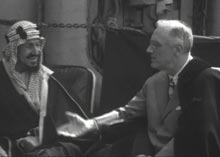These days I had the luck to see the documentary ‘House of Saud’ by filmmaker Jihan El-Tahri. A BBC/ARTE/PBS/NHK production, which first has been aired in 2004.
Until 9/11, most Americans paid little attention to how the Kingdom of Saudi Arabia was run. But in the aftermath of the attacks, America awoke to some difficult truths about its longtime ally: for decades, Saudi wealth and charities supported individuals and organizations dedicated to doing America harm, and its universities and religious schools—known as madrassas—prepared countless young men for jihad against the West.
Today, Saudi television broadcasts programs where children read poems against Jews and in praise of Islamic martyrs. Recently twenty-six Saudi clerics, among them, Sheikh Nasser al-Omar, issued a fatwa, or edict, encouraging Muslims to fight the Americans in Iraq. And in December 2004, gunmen attacked the American consulate in Jeddah.
“Investigating the history of U.S.-Saudi relations, it quickly becomes clear that this is an alliance built on quicksand,” says co-producer Martin Smith, who has reported from the region for previous FRONTLINE films including “Saudi Time Bomb?” and “In Search of Al Qaeda.”
It was Franklin Roosevelt, seen in rare archival footage conducting a top-secret World War II meeting with Saudi King Abd al-Aziz on board the USS Quincy, who established the basic principles behind the U.S.-Saudi alliance.
“America struck a pact with Saudi Arabia, and the deal was very simple,” says Youssef Ibrahim, former Middle East bureau chief for The New York Times. “You give us oil at cheap prices, and we will give you protection. This protection eventually evolved into an American hegemony over the entire Gulf region, that this was an American area of influence, and in return for this it shall be protected from all enemies.”
As history shows, this agreement between Saudi Arabia’s royal family and the U.S government has been challenged time and again by Saudi Arabia’s fundamentalist Islamic population, who distrust American influence and intention and oppose America’s alliance with Israel. (excerpted from synopsis >> see link)
The documentary embeds some rarely shown historical footage and a unique view on the political entanglements which have led to a world as we live in now. What if King Abd al-Aziz’s suggestion to give the Jews the best part of the former 3rd Reich for what has been done to them would have been taken up, instead of displacing another people, which hadn’t to do anything at all with the inexcusable crime?
Thus really worth to see and rethink … – quite in the sense of de Beauvoir:
“Each of us is responsible for everything and to every human being.”
| By 1945, the U.S. urgently needs oil facilities to help supply forces fighting in the Second World War. Meanwhile, security is at the forefront of King Abd al-Aziz’s concerns. President Franklin Roosevelt invites the king to meet him aboard the U.S.S. Quincy, docked in the Suez Canal. The two leaders cement a secret oil-for-security pact: |  FDR and King Abd al-Aziz aboard the U.S.S. Quincy |
| The king guarantees to give the U.S. secure access to Saudi oil and in exchange the U.S. will provide military assistance and training to Saudi Arabia and build the Dhahran military base. Also discussed at the meeting is the issue of creating a Jewish homeland in Palestine. King Abd al-Aziz acknowledges the plight of the Jews, but argues taking part of Palestine is unfair to the Palestinians. In a letter to the king that Roosevelt sends after their meeting, the president writes: “I will take no action which might prove hostile to the Arab people.” But Roosevelt dies shortly after sending this letter and Vice President Harry Truman becomes president. (link) |
|
BBC interview with the filmmaker
view the documentary online at google.video
